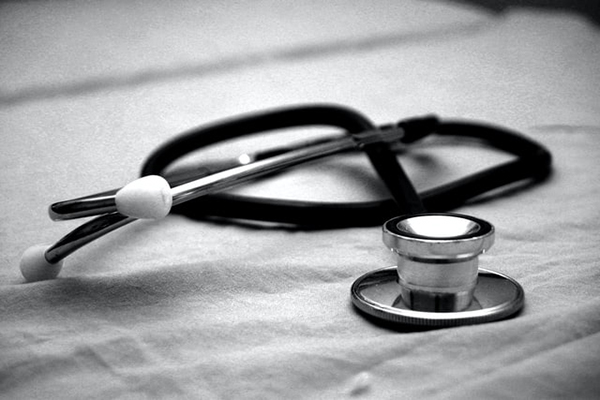Recipe: Lemon-Garlic Salmon Foil Pack with Green Beans and New Potatoes
Salmon has never been easier to cook, wrapped up in a packet to bake in the oven. As a bonus, crunchy green beans and garlicky potato slices are added for a complete meal.
How Vitamin D May Affect Depression
It’s no secret that vitamin D contributes to the development and maintenance of healthy, strong bones. But did you know that it is also being researched for its effects on depression?
Here Comes the Sun!
Our bodies naturally synthesize vitamin D when exposed to sunlight. All you need for a week’s worth of vitamin D is 15 to 20 minutes in the sun. Vitamin D helps the body absorb calcium, which supports the development and maintenance of healthy bones. This is critical in children as they grow. Adults also need vitamin D and calcium to prevent osteoporosis, or brittle bones, as they age.
While we’ve known about the connection between vitamin D and calcium for some time, more recent research is looking into the connection of vitamin D to depression. It is possible that this vitamin may play a role in improving symptoms of depression and seasonal affective disorder (SAD). Other research has shown that vitamin D may also improve muscle recovery, help prevent soreness and aching, and help with immune function.
You can get small amounts of vitamin D from foods including fish, eggs and fortified milk, but for people living in the Seattle area, it’s hard to get enough vitamin D without taking a supplement, particularly during winter.
Balancing Vitamins and Sunshine
The Institute of Medicine recommends a minimum daily allowance of 600 international units (IU) of vitamin D per day and 800 IU per day for people over age 70. People living in the Pacific Northwest may need more than this due to our limited exposure to the sun, particularly during winter.
Lisa Sieberson, DNP, ARNP, recommends to her patients that they take a daily vitamin D supplement with 1000 to 2000 IU to ensure sufficient vitamin D levels.
During the summer months, when the sun does come out in Seattle, it is easier to get those 15 to 20 minutes of sunshine per week. However, keep in mind that sunscreen blocks the UV light that allows our skin to synthesize vitamin D.
She doesn’t advise going into direct sunlight for extended periods of time without sunscreen, especially for those who are fair skinned or have other risk factors for skin cancer. For this reason, it may be worthwhile to take vitamin D supplements all year round.
Some people are more susceptible to low vitamin D than others. People with darker skin tones need more sunlight to synthesize enough vitamin D. Breast-fed infants are also prone to vitamin D deficiency because breast milk does not usually contain a sufficient amount of vitamin D and infants should not be exposed to direct sunlight.
Seattle’s latitude and propensity for cloudy days make it hard for all of us to get enough vitamin D, so if you’ve got the rainy-day blues and aren’t already taking vitamin D, you might want to consider a supplement to boost your vitamin D. Talk with your doctor!
Learn more about the author, Lisa Sieberson, DNP, ARNP or call 206.505.1300 for an appointment.
Is My Son Depressed, or Just Lazy?
By Jack Shriner, LICSW, CMHS
I have been asked this question by many parents with sons in middle and high school. In fact, this question often brings a family in for an initial appointment with a psychotherapist. Although I mostly hear from mothers worried about their sons, my thoughts apply well to fathers and daughters, too.
A mother will express concern that her son has been withdrawn, holed up in his room, eyes glued to his Xbox. He seems more irritable. Also, his grades may be lower than last year, he doesn’t spend as much time with friends, and it’s like pulling teeth to get him to do his household chores—let alone get ready for school in the morning.
So, does the son have a psychiatric condition that needs treatment? Or is he just pulling a fast one to get out of doing work? For parents, this often leads to another question: do I respond with concern or with discipline?
First, be sure to review the typical signs of clinical depression in the accompanying article.
It is important to remember that—aside from statements about suicide or evidence of self-harm—it’s perfectly normal for anyone to experience one or two of these things from time to time. We start talking about depression only when the symptoms are ongoing and excessive, and they cause clear problems with a child’s functioning at home or school.
So, let’s say your child is showing some signs of depression. You can be a positive influence. For starters, drop the word lazy from your vocabulary. The best way to change a child’s behavior is to encourage the behavior you want, not to criticize the behavior you don’t want. Using negative labels like “lazy” is more likely to discourage your son and may even confirm thoughts that he’s not living up to your expectations.
The bottom line is that good parenting involves a constant dance between concern and discipline. This dance is challenging, and no parent is always going to get it right. If you suspect your pre-teen or teenage son is depressed, consider the following responses:
- Think of discipline as teaching, not punishment. Keep a calm, neutral tone when setting and enforcing rules.
- Help your son make a plan for coping positively with sadness or stress. For example, consider using art, writing, music, exercise, relaxation, or outings.
- Share how you deal with feelings that arise in your life, such as frustration after a hard day at work.
- Limit factors in your son’s environment that seem to trigger negative feelings. For example, if you feel the Xbox is not helping, relocate it to the living room and limit his use.
Other circumstances such as grief, drug use or a condition called hypothyroidism can cause symptoms similar to depression. These should be ruled out by a health professional and treated appropriately.
Seek out a psychotherapist for additional help if needed. Don’t be afraid to ask lots of questions!
Jack Shriner, LICSW, CMHS, is a licensed clinical social worker at Pacific Medical Centers at Beacon Hill. Learn more about Jack and our other Behavioral Medicine providers. To make an appointment call 206.621.4045.
Know the Signs and Symptoms of Depression
 Depression is a common and treatable condition. This brain condition leaves a person feeling sad—but it’s different from normal sadness.
Depression is a common and treatable condition. This brain condition leaves a person feeling sad—but it’s different from normal sadness.
Depression can make it hard to work, concentrate or do everyday tasks. Depression can affect anyone, regardless of age, gender or health situation. It can affect people of any race or ethnic group.
What Are the Symptoms of Depression?
People with depression feel down most of the time for periods lasting at least two weeks. They also have at least one of these symptoms:
- No longer enjoy or care about doing the things they used to like to do
- Feel sad, down, irritable, hopeless or cranky most of the day, almost every day
Depression can also make people:
- Lose or gain weight.
- Sleep too much or too little.
- Feel tired or have no energy.
- Feel guilty or worthless.
- Forget things or feel confused.
- Think about death or suicide.
Are There Treatment Options?
Safe and effective treatments for depression are available. They include seeing a psychotherapist, taking medications or a combination. Talk with your primary care provider to decide what options are right for you.
As you recover, remember that taking good care of yourself can also help boost your emotional state. Specifically, get regular exercise, like walking briskly or cycling three to five times each week. Be sure to eat a healthy and balanced diet. Avoid drugs and alcohol; they can worsen depression symptoms.
Finally, reach out to friends and family whom you are comfortable with. Talking openly and surrounding yourself with supportive, understanding people is important for recovery.
Learn more about our Behavioral Medicine team at PacMed. Our team of licensed therapists offers individual, couples and family therapy. They also can help with medication management and provide psychiatric evaluation. To make an appointment, use our appointment tool or call 206.621.4045.
Are You or Someone You Know in Crisis?
If you are thinking about suicide or hurting yourself, help is available:
- In an emergency, call 9-1-1
- Go to the emergency room at your local hospital
- Call the King County 24-Hour Crisis Line: 1 (866) 427-4747
- Call the National Suicide Prevention Lifeline: 1 (800) 273-8255
- Call your health care provider and tell them it is urgent
PacMed Receives Gold Award in Seattle Business Magazine’s 2017 Leaders in Health Care Awards
Pacific Medical Centers is honored to announce that we have received the Achievement in Community Outreach Gold Award from Seattle Business magazine for its 2017 Leaders in Health Care Awards. This prestigious accolade recognizes PacMed’s outstanding efforts to connect with its diverse patient population and disadvantaged neighborhoods to promote health. This is the second time PacMed has been selected for the award from among the region’s health care community.
One of the many ways PacMed is committed to serving our community and ensuring patients receive access to quality health care is by offering same-day appointments and extended evening and weekend hours. PacMed also provides digital access to health care, enabling patients and providers to communicate through MyChart, its online patient portal. Additionally, PacMed is a founding member of Project Access Northwest, a nonprofit that helps underinsured patients by removing financial barriers to quality care. Today, Project Access Northwest facilities reach more than 35,000 patients in the Puget Sound area.
The Achievement in Community Outreach Award also recognizes PacMed’s commitment to providing health care to underinsured patients, specifically through affordable medicine. PacMed has taken drastic measures to reduce the cost of medications, especially for disadvantaged communities. Today, the organization has an 80 percent rate of prescribing lower cost generic drugs, which is 10 percent better than the industry average.
PacMed is honored to receive the Gold Award for Achievement in Community Outreach as part of Seattle Business magazine’s 2017 Leaders in Health Care Awards. PacMed congratulates its excellent staff and 150+ providers at 11 clinics who make access to quality care possible for patients in the Puget Sound region.
PacMed Wins Gold in Health Care Leaders Awards
Pacific Medical Centers has been awarded the Gold Award in the 2017 Leaders in Health Care Awards: Achievement in Community Outreach.
Quality and respect. These are the words Pacific Medical Centers (PacMed) employees live and work by. The group is a private, not-for-profit, primary and integrated multispecialty health care network with outpatient clinics across the Puget Sound region and more than 168 primary and specialty care providers. Affiliated with the Providence Health & Services system, PacMed provides patient-focused health care — and even same-day appointments — to nearly 100,000 patients in King, Snohomish and Pierce counties.
Its philosophy is to empower patients to participate in their care and focus on wellness, prevention and proactive management of chronic conditions. PacMed’s approach reflects its history as the first U.S. Public Health Service Hospital in Seattle. Throughout its history, PacMed has served diverse patient populations within the community, including the underserved, multiple ethnic groups, military families and commercially insured patients.
PacMed is one of only six providers in the nation and the only provider on the West Coast to bring the U.S. Family Health Plan (USFHP) program to active-duty family members and retired personnel. As a result, some patients have been with PacMed and the program for 15 to 20 years and have developed strong partnerships with their physicians. It’s also a cofounding member of Project Access Northwest, which encourages specialty physicians to provide care at no cost to low-income, uninsured individuals.
Eat More Fiber for Digestive Health
By a PacMed Dietitian
 Are you getting enough fiber in your diet? Adequate fiber intake can help lower cholesterol levels, keep blood sugar levels under control and prevent constipation and diverticulosis.
Are you getting enough fiber in your diet? Adequate fiber intake can help lower cholesterol levels, keep blood sugar levels under control and prevent constipation and diverticulosis.
A high-fiber diet is also usually lower in calories and can increase feelings of fullness after meals, which can help promote a healthy weight. So, how much fiber do we need? What are good sources?
The recommended amount of fiber is 25g per day for women (21g over age 51) and 38g per day for men (30g over age 51). Unfortunately, most Americans fall far short of the recommended amount.
Fiber is found in plant foods such as fruits and vegetables, nuts and seeds, and whole-grain products.
Try these simple substitutions to increase the amount of fiber in your diet:
- Have steel cut oats with nuts and berries for breakfast instead of cereal.
- At lunchtime, choose bread products that say “whole wheat” as one of the first ingredients and add vegetables such as tomatoes, cucumber and spinach to sandwiches or wraps.
- Add more vegetables or beans to casseroles and stews.
- Try brown rice or wheat pasta instead of white rice or pasta.
- Snack on fruits and vegetables during the day instead of packaged snacks from home or the vending machine.
As you increase the fiber in your diet, do it gradually and drink plenty of fluids. You may experience constipation and nausea if you consume more than your usual amount of fiber without adequate fluid intake.
Colorectal Cancer Risks and Prevention
In 2017, the American Cancer Society predicts some 135,000 new cases of colorectal cancer and about 50,000 deaths. But this doesn’t have to be the case! The disease is largely preventable with regular screening and is treatable with early detection.
If you are over 45 or have a family history of colorectal cancer, talk to your doctor about getting screened today. The more you know, the better you can take care of your health.
Colorectal Cancer Signs & Symptoms
Colorectal cancer—also commonly called colon cancer—often has no symptoms. This is why screening is so important. These symptoms, however, might indicate colorectal cancer:
- Blood in your stools
- Unexplained abdominal pain
- Unexplained change in bowel habits
- Unexplained anemia
- Unexplained weight loss
Screening/Early Detection
Colon cancer is mostly preventable with regular screening. Screening can help catch colon cancer at an early, curable stage. It also gives your care team the ability to find and remove precancerous polyps.
Beginning at age 45, both men and women who are at average risk for developing colorectal cancer should have a screening colonoscopy and then repeat the procedure every 10 years. All men and women are at risk for colorectal cancer. However, African Americans, Hispanics and Ashkenazi Jews (people of Eastern European descent) are at a higher risk for the disease than other populations.
Understand Your Insurance Coverage
Before you get your screening, be sure to talk with your insurance company about your coverage for a colonoscopy. It’s important to understand your insurance coverage for a routine, preventive colonoscopy screening—but also your coverage if a biopsy or polyp is removed during your screening.
A Colonoscopy Is Easier Than You Think
A colonoscopy could save your life! When colorectal cancer is detected early, it can be treated. But many people avoid getting a colonoscopy because they feel embarrassed or afraid. Here’s what to expect.
A colonoscopy is a medical screening that checks your colon for cancer and any polyps (unusual growths). To do the screening, the doctor uses a thin, flexible scope that has a light and a small camera on the end. The procedure usually lasts just 15–30 minutes.
For the vast majority of patients, a colonoscopy is easy or mildly uncomfortable. The benefit can be enormous—life-saving, in fact! Learn more by talking with your primary care provider or gastroenterologist.
At-Home Preparation
The preparation you do at home in the days before your colonoscopy are key to a successful screening. If you don’t understand any part of the instructions, be sure to ask your doctor or nurse.
The colon must be empty and clean before the screening. So, for several days before the procedure, you will follow a limited diet. On the day before the screening, you will drink large amounts of a laxative, to ensure your colon is empty. (You will need to be at home on this day because you will use the bathroom frequently.) For the last half-day or night, you will consume only clear fluids.
Finally, be sure to enlist a friend or family member to drive you home from the screening. You cannot take a cab or other service.
During the Colonoscopy
You will be lightly sedated so you relax. You will probably feel sleepy. Most people, in fact, are unable to remember the procedure afterward.
During the screening, you will be covered with a drape. The doctor will examine the walls of your colon using the scope. If you are awake, the doctor will let you know what to expect and check on your comfort. If the doctor finds some small polyps (growths), those may be removed because some polyps can become cancerous over time. If the doctor finds larger polyps, those will be removed and sent to the lab for testing.
Tips for Keeping Your Heart Healthy This Valentine’s Day

February means Valentine’s Day is almost upon us, and hearts, chocolate and sentiments of love are nearly inescapable at your local grocery store. Since hearts are already on everyone’s mind, what better time to talk about heart health? Dr. Bobbie Paramsothy of Pacific Medical Centers shares some myths, tips and preventive measures that can help you show your heart a little love this February.
Myths
Dr. Bobbie Paramsothy, MD dispels myths and offers tips related to heart health.
People may be lulled into a false sense of security if no one in their family has a history of heart disease, says Paramsothy. If you have other risk factors (see below), you are still a candidate for heart disease, even without a family history. On the flip side, people who eat well and exercise may consider themselves safe, but there can be a strong genetic component. “Although exercise and a good diet decrease your risk significantly, if you have a strong family history of high cholesterol or early heart disease, you may still have an increased risk,” she says.
Another common belief is that heart disease is an issue for older people. Not so, says Paramsothy. “We are seeing an increase in heart disease and even heart attacks in young people due to premature heart disease.”
Those at the highest risk are people with high cholesterol, high blood pressure, chronic kidney disease or diabetes, plus smokers and individuals with a family history of premature heart disease. However, she warns, “poor diet, physical inactivity and obesity increase the risk.”
Tips for a Healthier Heart
If you fall into the at-risk category, Paramsothy recommends several steps you can take such as losing weight, eliminating fast food and cigarettes, adding vegetables and fresh fruit to your diet and getting regular exercise. “See a health provider to get your blood pressure, blood sugar and cholesterol checked,” she adds. “Although a healthy diet and exercise decrease your risk of heart disease significantly, sometimes they are not enough and you may need medication.” If you are at significant risk for heart disease or don’t normally exercise, she also advises that you consult a health provider before starting a rigorous routine.
The new Pacific Medical Centers Lacey location includes seven primary care providers and 50 total employees. Photo courtesy: Pacific Medical Centers.
Stress and trauma can also play a role. A recent study (Sumner et al. Circulation, June 2015), involving the Nurses’ Health Study II, demonstrated that women who had experienced a traumatic event during their life had a 45% higher risk of heart attack or stroke compared to those who had never experienced a traumatic event. “If you are experiencing symptoms of post-traumatic stress disorder, anxiety or depression, seeking mental health expertise is important for your overall health and heart health,” says Paramsothy.
Finally, friendships and social connections are important. Paramsothy cites another study (Valorta et al. Heart. April, 2016) that found that people who were lonely or socially isolated had a 29% higher risk of heart disease and a 32% risk of stroke. “All human beings need social interaction to thrive,” she says. “Seniors are especially vulnerable to loneliness and social isolation, so addressing those issues is an important public health concern.”
As you pass by all the hearts in the grocery aisle, let them be a reminder to take care of your heart health, consult a physician as needed and stay connected with the important people in your life this Valentine’s Day.












